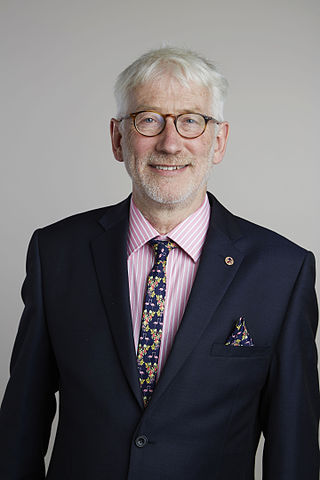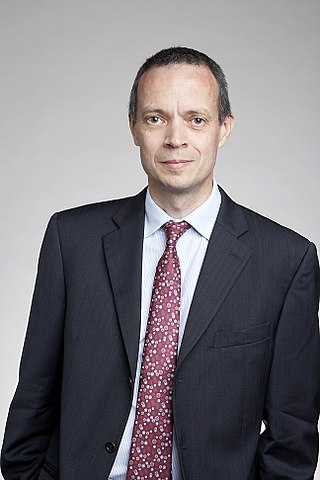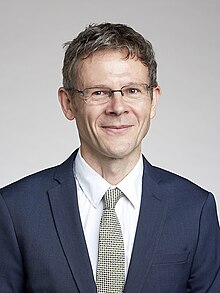
Michael James Benton is a British palaeontologist, and professor of vertebrate palaeontology in the School of Earth Sciences at the University of Bristol. His published work has mostly concentrated on the evolution of Triassic reptiles but he has also worked on extinction events and faunal changes in the fossil record.

John G. Rarity is professor of optical communication systems in the department of electrical and electronic engineering at the University of Bristol, a post he has held since 1 January 2003. He is an international expert on quantum optics, quantum cryptography and quantum communication using single photons and entanglement. Rarity is a member of the Quantum Computation and Information group and quantum photonics at the University of Bristol.
In basalt petrogenesis polybaric melting implies that liquids are incrementally separated from residues across a range of pressures and subsequently mix and move through the mantle without equilibrating with surrounding mantle minerals. This model was developed to better approximate basalt petrogenesis in modeling and experiments. It usually involves polybaric near-fractional melting along an adiabatic path.
Judith Ann Kathleen Howard is a British chemist, crystallographer and Professor of Chemistry at Durham University.
Professor Henry "Harry" Elderfield, was Professor of Ocean Chemistry and Palaeochemistry at the Godwin Laboratory in the Department of Earth Sciences at the University of Cambridge. He made his name in ocean chemistry and palaeochemistry, using trace metals and isotopes in biogenic carbonate as palaeochemical tracers, and studying the chemistry of modern and ancient oceans - especially those of the glacial epoch and the Cenozoic.
Geoffrey Eglinton, FRS was a British chemist and emeritus professor and senior research fellow in earth sciences at the University of Bristol.
Timothy Robert Birkhead is a British ornithologist. He has been Professor of Behaviour and Evolution at the University of Sheffield since 1976.
Jonathan Alan Hodgkin is a British biochemist, Professor of Genetics at the University of Oxford and an emeritus fellow of Keble College, Oxford.

Timothy Noel Palmer CBE FRS is a mathematical physicist by training. He has spent most of his career working on the dynamics and predictability of weather and climate. Among various research achievements, he pioneered the development of probabilistic ensemble forecasting techniques for weather and climate prediction. These techniques are now standard in operational weather and climate prediction around the world, and are central for reliable decision making for many commercial and humanitarian applications.
Simon Tavaré is the founding Director of the Herbert and Florence Irving Institute of Cancer Dynamics at Columbia University. Prior to joining Columbia, he was Director of the Cancer Research UK Cambridge Institute, Professor of Cancer Research at the Department of Oncology and Professor in the Department of Applied Mathematics and Theoretical Physics (DAMTP) at the University of Cambridge.

Timothy John Barrington Holland is a petrologist and Emeritus Professor in the Department of Earth Sciences at the University of Cambridge.

David Lodge is a research fellow in the Department of Physiology and Pharmacology at the University of Bristol.
The Royal Society University Research Fellowship (URF) is a research fellowship awarded to outstanding early career scientists in the United Kingdom who are judged by the Royal Society to have the potential to become leaders in their field. The research fellowship funds all areas of research in natural science including life sciences, physical sciences and engineering, but excluding clinical medicine.

Andrew John Orr-Ewing is a British chemist and Professor of physical chemistry at the University of Bristol. His work investigates the mechanisms of chemical reaction in both the gas and liquid phases and has used ultrafast laser spectroscopy to observe the effects of solvents on molecular reaction and the dynamics of photodissociation.
Lucy Jane Carpenter is professor of physical chemistry at the University of York and director of the Cape Verde Atmospheric Observatory (CVAO).

Sir Robin William Grimes is chief scientific adviser in the Ministry of Defense (MoD) for nuclear science and technology and professor of materials physics at Imperial College London. From February 2013 to August 2018 he served as chief scientific adviser to the Foreign and Commonwealth Office (FCO). Since November 2021 he has been Foreign Secretary of The Royal Society

Timothy Peter Softley is Pro-vice-chancellor (PVC) for research and knowledge transfer at the University of Birmingham.
Matthew F. S. Rushworth is Watts Professor of Experimental Psychology at the University of Oxford where his laboratory is funded by the Wellcome Trust and Medical Research Council.
John-Michael Kendall is a Geophysicist and Professor in the Department of Earth Sciences at the University of Oxford.
Richard M. Harland is CH Li Distinguished Professor of Genetics, Genomics and Development at the University of California, Berkeley.








